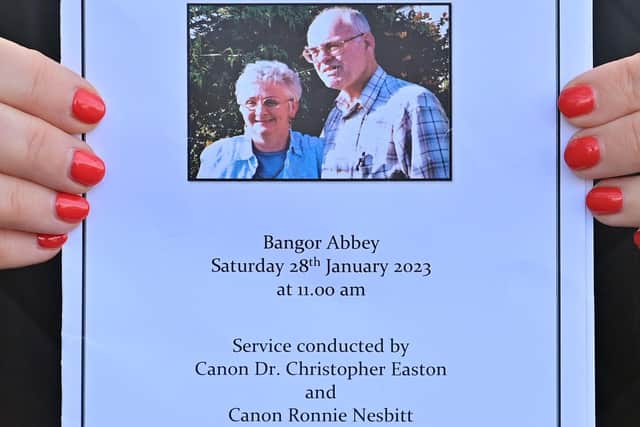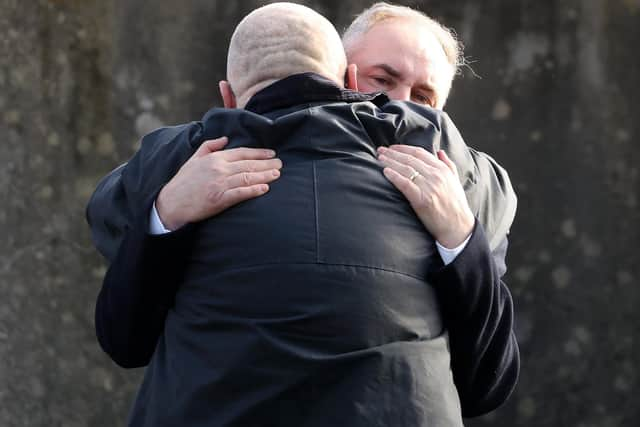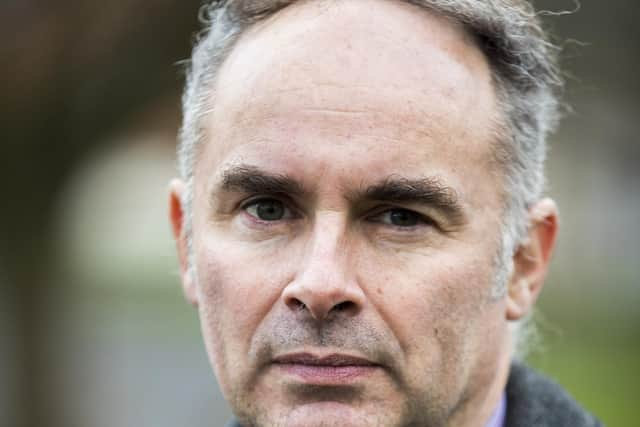Alex Easton: Heartbreaking interview with unionist MLA reveals he has been diagnosed with PTSD after death of parents in a Bangor house fire - ' I wouldn’t want anyone to feel the way I did'
This article contains affiliate links. We may earn a small commission on items purchased through this article, but that does not affect our editorial judgement.
and live on Freeview channel 276
Unionist MLA Alex Easton has now been diagnosed with PTSD after the death of his parents in a house fire in 2023 in Bangor.
Advertisement
Hide AdAdvertisement
Hide AdIn an emotional interview he told of the mental health journey over the last year which culminated with him being diagnosed with Post Traumatic Stress Disorder.
He told BBC Good Morning Ulster he had been suffering flashbacks initiating from his identifying the bodies of his parents at the back of their home, after the fire.
He said: "One of us had to go and identify them out the back of the house and I chose to do that because I didn’t want them to see potentially what it was going to be like. So I took that on myself,” he said.
Mr Easton said after his parents deaths he “went back to work straight away because I thought that was my way of dealing with it, trying to take my mind off it and I just worked and worked and worked”.
Advertisement
Hide AdAdvertisement
Hide AdHe added: “I would go out at night walking around housing estates to find street lights to report, just to do anything to keep my mind off it.
"I called it my black dog and those periods came on more and more until one day they were there just there all the time and didn’t leave me,” he added.
Mr Easton added that his sleep “had absolutely gone to pot and I just kept driving and driving at my work and it just overwhelmed me”.
"One day my GP appeared out of the blue and sat me down basically and he chatted me through what was going on,” he said.


Advertisement
Hide AdAdvertisement
Hide Ad"And got me on medication and got me help with a councillor,” he added.
"And that was probably the thing that saved me to be honest.”
When asked how his mental state affected the relationships with his family, Mr Easton said: “I think it is a bit of a man thing and you think you have to be tough and because I am a politician you have all these expectations of trying to help people and maybe they don’t realise there is a human side to me and a gentle side, another side to the exterior people expect to come to.
“I didn’t want to be here.


"But help came to me just at the right time and it got me into a better place”.
Advertisement
Hide AdAdvertisement
Hide AdThe Bangor politician added that he “still has my issues” but he tried to “battle through them” adding that “there are a lot of good people out there who have been very supportive and caring”.
"I can’t thank those people enough,” he said.
Mr Easton said said he was “diagnosed with PTSD as I would wake up with flashes of my parents lying in the back garden”.
"It was a blur when I was there but there are specific things that stand out like my dad had a really long white beard and when I identified him his beard was black,” he said.
“And my mum had a trickle of blood rolling down her left arm and that stuck in my conscious,” he told BBC Good Morning Ulster.


Advertisement
Hide AdAdvertisement
Hide Ad“They are a lot less now than they were and things are a lot easier now that way,” he added.
When asked what advice he would give other people after his harrowing experience, Mr Easton said: “I have turned a corner in some ways and it has made me more understanding of people who have mental health issues and what they go through.
"My advice is – don’t go down the road I did of thinking you have to be strong and you have to spend your time thinking about everybody else.
"It is so important to go and get help.
"Don’t go down that dark route as it is lonely and I wouldn’t want anyone to feel the way I did”.
Advertisement
Hide AdAdvertisement
Hide AdAnyone needing help should contact Samaritans on 0808 808 8000
What is Post-traumatic stress disorder? Taken from NHS Choices
Post-traumatic stress disorder (PTSD) is an anxiety disorder caused by very stressful, frightening or distressing events
Some with PTSD often relives the traumatic event through nightmares and flashbacks, and may experience feelings of isolation, irritability and guilt.
Advertisement
Hide AdAdvertisement
Hide AdThey may also have problems sleeping, such as insomnia, and find concentrating difficult.
These symptoms are often severe and persistent enough to have a significant impact on the person's day-to-day life.
PTSD is estimated to affect about 1 in every 3 people who have a traumatic experience, but it's not clear exactly why some people develop the condition and others do not.
You should see a GP if you or your child are still having problems about 4 weeks after the traumatic experience, or if the symptoms are particularly troublesome.
If necessary, your GP can refer you to mental health specialists for further assessment and treatment.